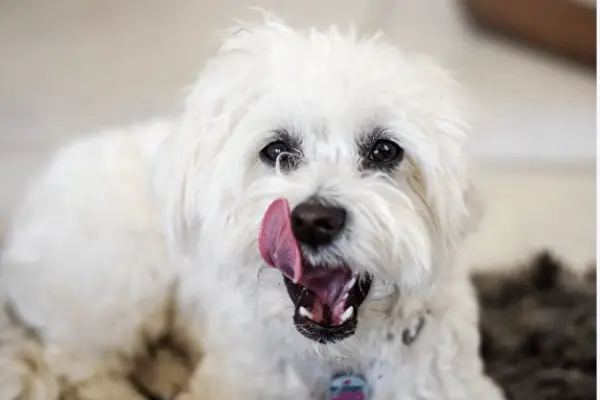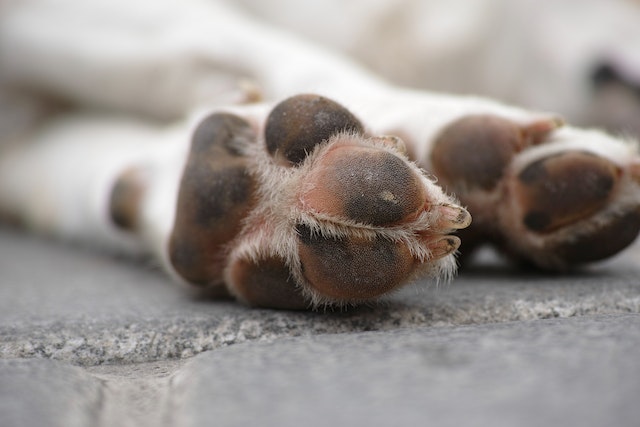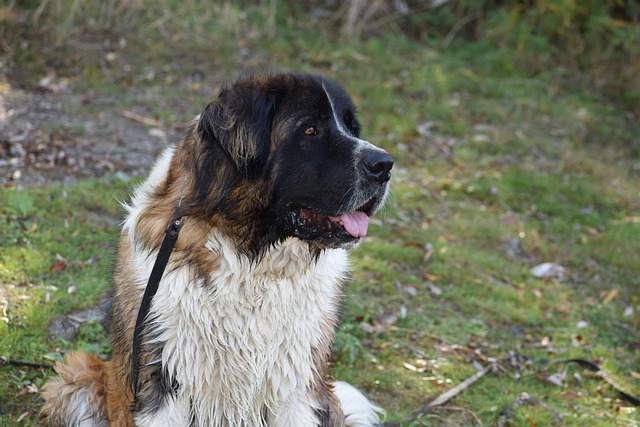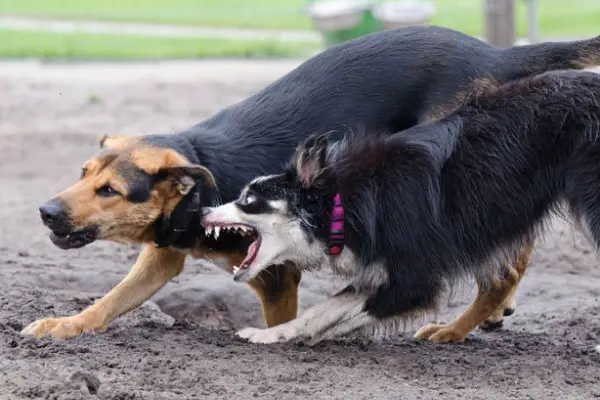Do Maltese Bite: 7 Reasons They May Bite & Tips

Every dog does bite, but the frequency of biting differs among dogs, so do Maltese bite? Let’s find out together!
Since every dog bites, we will be discussing circumstances that your Maltese may bite and how to handle a biting Maltese.
So… Keep reading!
Do Maltese Bite
Maltese dogs are not known for biting, however, they can bite to defend themselves, as a result of poor socialization, and to nip out of excitement, they are also known to be companion dogs who are extremely playful with children and other pets.
Over-excitement bites, which can be painful but are not purposeful, are the most common form of bite seen in Maltese.
Play aggressiveness, which is observed in all dogs, not only Maltese, can cause them to nip or bite.
Why do Maltese dogs bite
Maltese may bite for a variety of reasons, including fear, self-defense, anxiety, over-excitement, and a lack of proper socialization and training.
Let me break these reasons down…
Here are some of the most common reasons why Maltese may bite;
1. Teething stages
When Maltese pups are young, they are prone to this form of biting.
The greatest time to educate Maltese not to bite excessively is when they are puppies.
Bite from a teething Maltese may not hurt as much as a bite from an adult Maltese.
Even with the standard don’t bite instruction, this sort of biting might endure until the teething periods are over.
2. Defending themselves
Maltese dogs are small dogs that are afraid of anything that appears to be larger than them.
When they are confronted with something larger than themselves, this might cause them to become aggressive, which can lead to unwanted biting.
Maltese, like other dogs, are not aggressive and are not renowned for biting needlessly, although they can bite to protect or defend themselves.
Every dog bites to defend itself or their owners, although some dogs bite more frequently than others.
3. Maltese bite due to depression or anxiety
Biting, whining, and nipping are all bad Maltese habits that may be corrected.
When a Maltese is removed from its owner, it becomes enraged and may accidentally bite.
The rage usually lasts longer and is more aggressive, with the majority of the time being spent biting.
To minimize Maltese separation anxiety issues, consult your doctor or obtain a second pet to keep your Maltese company.
Although stress might drive a Maltese to become upset and attack anyone in their vicinity, it’s critical to remove any causes of tension.
Many Maltese behavior issues stem from a lack of socialization, which can eventually lead to needless biting or barking.
Biting is not acceptable in a well-socialized Maltese, since they learn this during socialization and training.
Maltese bites are usually caused by a lack of socialization and are usually associated with fear and self-defense.
You must learn to expose and socialize your Maltese from the puppy stages onwards to prevent all types of Maltese bites caused by improper socialization.
5. Maltese do bite when startled
When startled, Maltese, like other small dogs, can bite, particularly if they’ve been resting, sleeping, or relaxing.
A terrified Maltese may become disoriented and confused about their surroundings, biting as a result.
This is especially prevalent among senior Maltese, who may have impaired vision or hearing and get confused if awakened awake.
Always be cautious not to wake a sleeping Maltese, and instruct your youngsters to stay out of their Maltese bedrooms.
6. Maltese do bite out of fear
Fear is one of the most common causes of Maltese bites; if your Maltese feels threatened, he’ll bite.
Fear leads to useless actions like whining, barking, and biting aggressiveness in Maltese.
A Maltese bites most of the time in response to aggressiveness, fear, or threat, or when danger is approaching.
Keep your Maltese away from anything that frightens him, or better yet, socializes him with his fear.
7. Aggression of being sick or injured
Maltese dogs are not aggressive but when they are ill or injured they may be extremely stressed, frightening, and unpleasant.
Even the most tolerant Maltese can bite if it is injured or in pain, as ill Maltese can become aggressive.
If your Maltese is injured, keep in mind that they might bite if they are touched, so be cautious when lifting or moving him.
Make an appointment with your veterinarian as well as a local positive reinforcement trainer if your Maltese’s behavior suddenly changes.
How to stop Maltese dog from biting
Some common approaches for preventing or educating Maltese not to bite are as follows:
1. Socialize your Maltese as early as possible
When Maltese come into contact with items that are larger than they are, they become irritated.
If you want a quiet and tranquil Maltese who won’t attack other animals, this is one of the most important things you can do.
Early socialization is critical for your Maltese to prevent having a variety of harmful tendencies later in life.
Puppy lessons, dog cartoon films and television shows, dog parks, and regular walks are all popular ways to socialize your Maltese.
2. When Maltese tries to bite put them in time out
Start giving your Maltese time-outs whenever his teeth scrape against your skin, rather than only when he bites you too hard.
Let out a high-pitched reaction as soon as your Maltese’s teeth brush against you.
Take a step back from him after that. For 30 to 60 seconds, ignore him.
To avoid biting, gently place your Maltese in their kennel to enable them to cool down.
It’s critical that your Maltese doesn’t link the time-out with punishment, so be calm. You can let the Maltese out after it has calmed down.
3. Try desensitization of your Maltese
Because loud noises and sounds are one of the things that make pugs uneasy, you should potentially expose or desensitize your Maltese to them.
These are mostly intended to teach your Maltese that loud noises aren’t a threat and that he or they should remain calm when confronted with them.
If your Maltese becomes agitated when the doorbell rings, try socializing or desensitizing him with it.
If your Maltese can’t stand seeing the mailman, for example, contact him and socialize him with your Maltese.
Introduce your Maltese to all the things that make him nervous so that he may become acclimated to them.
4. Teach your Maltese to ignore distractions
Dogs can become aggressive under certain circumstances. To avoid this, you should teach your Maltese to ignore other dogs.
The most successful method is to provide positive reinforcement. If your Maltese becomes defensive, you give him a ‘reward’ and put him in ‘time out.’
Only while you’re giving the dog his goodie will he be compelled to remain motionless and safe.
If you utilize gifts to distract and amuse your Maltese, you can teach him to keep going.
5. Provide alternative item to chew
It’s a good idea to keep a puppy chew toy available at all times, so you can anticipate biting and replace your hand or furniture with the toy.
This will teach puppies what is and is not acceptable to bite or chew.
Offer a toy instead if they start chewing at your fingers or toes while you’re playing.
If they continue to nip, end the play session right away.
You may refocus your puppy by asking them to sit and rewarding them with a toy if you’ve been teaching them to sit.
6. Avoid pounce play
If your Maltese is bouncing on your legs or feet as you walk, which is a normal fun puppy habit correct them.
I recommend keeping a high-value reward next to your leg while you walk to encourage the puppy to learn to walk politely beside you.
When teaching a puppy to walk on a leash, the same method is employed.
7. Reinforce Maltese behaviors you desire
We often forget to reward our puppy with a “good dog,” a piece of kibble, or a pat when he or she is calm and quiet.
You’ll use positive reinforcement to assist Maltese to understand the actions you’re searching for.
8. Teach your Maltese to accept hands towards his mouth
You must teach your Maltese not to bite you when you bring your hands near their mouth.
Give them a little incentive and rapidly remove it from their mouth to do this, but be careful not to harm them if your Maltese is food-oriented.
All of this is merely to ensure that your Maltese is aware that biting is never appropriate or acceptable.
Allow your Maltese to grab as many goodies as he likes from your hands before putting them in his mouth.
With the information provided on this page, I strongly hope your question Do Maltese Bite was answered to your understanding.






![Do Beagles Like To Cuddle [Helpful Tips] Do Beagles Like To Cuddle](https://petcreeks.com/wp-content/uploads/2023/04/Do-Beagles-Like-To-Cuddle-768x555.jpg)